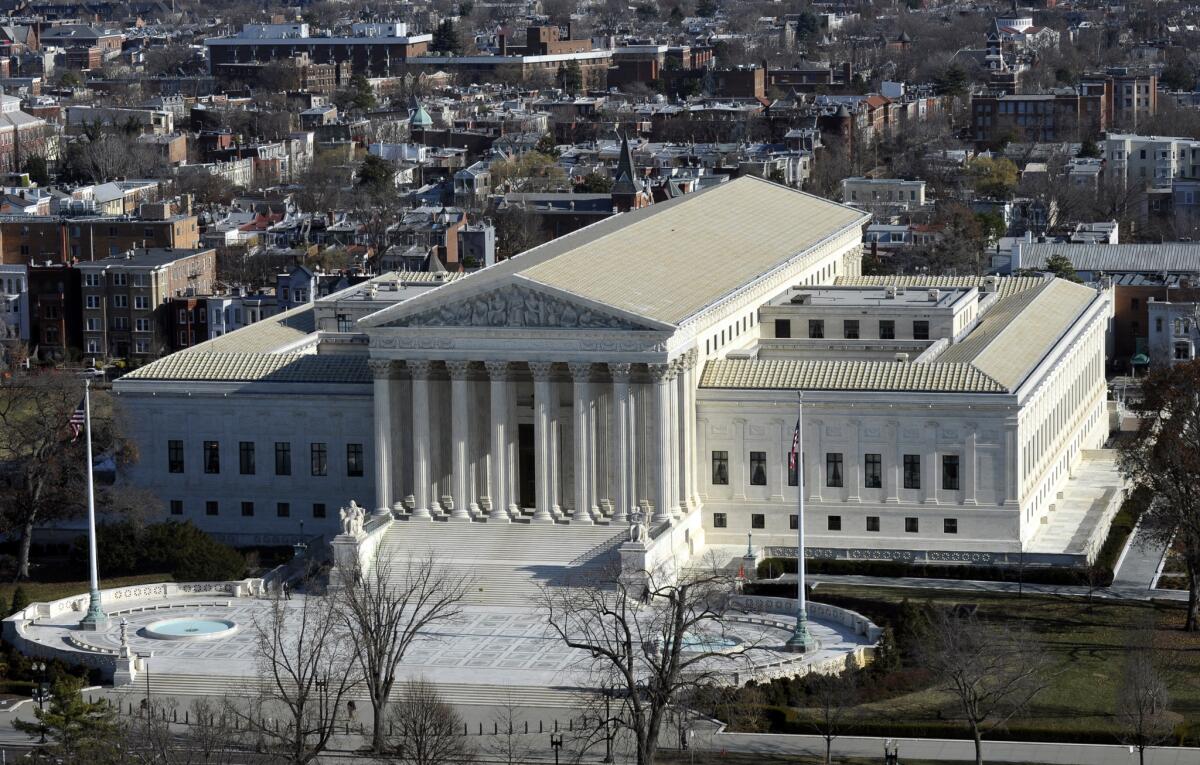Trump administration is asking Supreme Court to strike down California sanctuary law

- Share via
WASHINGTON — President Trump’s lawyers are asking the Supreme Court to strike down a California sanctuary law and declare that the federal government has the exclusive power over immigrants in this country.
They filed a broadly worded appeal petition Friday in the case of United States vs. California and urged the justices to void a 2-year-old state law that generally bars police and local law enforcement from cooperating with federal immigration agents, including by notifying them of immigrants who are about to be released from custody.
Earlier, the administration lost before a federal judge and the 9th Circuit Court in San Francisco, which ruled that state and local officials had no duty to help enforce federal immigration law. “Refusing to help is not the same as impeding,” said U.S. District Judge John Mendez in Sacramento.
In his appeal, U.S. Solicitor General Noel Francisco said the judges based in California misunderstood the line between federal authority and a state’s right. “The Constitution does not confer a right on California to make that choice” against cooperating and “to adopt a law that makes the jobs of federal immigration authorities more difficult,” he said. “The federal government has exclusive authority over the presence of aliens in the United States, including which aliens may be removed from the United States and the procedures for doing so.”
The appeal could set the stage for another major immigration decision by the Supreme Court in the election year. The justices will hear arguments Nov. 12 on whether Trump was justified in repealing the Obama-era rule that has shielded about 700,000 young immigrants from being deported.
The new case arose shortly after Trump took office. The California legislature passed three measures designed to protect immigrants in the country illegally from more aggressive federal enforcement. One provision that was successfully challenged would have imposed penalties on private employers for cooperating with immigration agents. But most of the law has remained intact.
The most significant measure, known as SB 54, limited police from sharing information about immigrants unless the immigrants were convicted of violent or serious crimes.
In the legal battle so far, California’s lawyers and the 9th Circuit judges have relied on conservative Supreme Court rulings that championed states’ rights. They cited a 1997 opinion by the late Justice Antonin Scalia, who ruled that a Montana sheriff could not be required to conduct the required background checks for handgun purchasers under the Brady Act. Scalia said the Constitution protected the sovereignty of states and made clear the federal government may not “commandeer” state or local officials to enforce federal law.
“The federal government may neither issue directives requiring the states to address particular problems, nor command the states’ officers, or those of their political subdivisions, to administer or enforce a federal regulatory program,” he wrote in Printz vs. United States.
In April, the 9th Circuit cited that principle and Scalia’s opinion in upholding the California law. “We have no doubt that SB 54 makes the jobs of federal immigration authorities more difficult,” wrote Judge Milan D. Smith. Even so, “the United States’ position that such obstruction is unlawful runs directly afoul of the 10th Amendment and the anti-commandeering rule.”
Meanwhile, Trump’s lawyers rely heavily on a liberal ruling by the Supreme Court in 2012 that sided with the Obama administration and voided much of an Arizona law that would have empowered local police to arrest and detain immigrants in the country illegally. In Arizona vs. United States, the justices said immigration is a federal matter.
The solicitor general quoted the high court saying then that “supremacy of the national power” in immigration enforcement was “made clear by the Constitution.” He noted that California joined 11 other states in arguing that “the removal of undocumented immigrants is an exclusively federal function.”
“It cannot be,” he wrote, that federal law or the Constitution would prevent Arizona “from adopting its own policies ... designed to enhance federal immigration enforcement, yet permit” California to “adopt its own policies...that are designed to obstruct federal enforcement.”
Under the court’s rules, California Atty. Gen. Xavier Becerra has 30 days to file a response. That would leave time for the justices to grant review in the case and issue a decision before the term’s end in late June.
More to Read
Get the L.A. Times Politics newsletter
Deeply reported insights into legislation, politics and policy from Sacramento, Washington and beyond. In your inbox twice per week.
You may occasionally receive promotional content from the Los Angeles Times.











